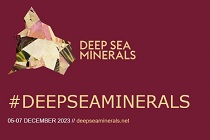 The third annual Deep Sea Minerals conference was held in Bergen from 5-7 December 2023.
The third annual Deep Sea Minerals conference was held in Bergen from 5-7 December 2023.
The event attracted a large international group of professionals from both academia, exploration companies, the mining industry and representatives of Norwegian authorities and international organisations interested in the topic of polymetallic mineral exploration and mining.
Currently the largest event of its kind specifically dedicated to aspects of deep-sea mineral exploration techniques, it has again attracted a wide range of experts from various industries and research centres from Norway and around the world.
The conference was divided into sessions devoted to, among other things:
- findings from recent research campaigns in the Arctic region of the Mid-Atlantic Ridge,
- resources, geology and environmental characteristics of deep-sea areas,
- verification of exploration techniques related to the development of effective survey methods and experience from the survey work carried out,
- developments in mining technology and effective ways of processing polymetallic raw materials,
- social legitimacy for the exploration of raw materials from the bottom, transparency of research and access to data.
Key companies and organisations such as AkerBP, CGG, EMGS, JOGMEC, LOKE, THE METALS, NTNU, PGS, Shearwater, TGS, WWF, et al. and regulators NPD and ISA shared their experience and future plans. In addition, the conference included an expert debate to discuss the current state of play and available knowledge on deep-sea ecosystems, as well as effective solutions to minimise the environmental impact of exploitation. The information presented is of great value to PIG-NRI's ongoing exploration for massive sulphides within the Polish Atlantic concession.
Exchanging knowledge with experts and establishing direct contacts with the industry enables the Polish Geological Institute - NRI to conduct comprehensive deep-sea research using proven state-of-the-art research techniques, minimising risks and improving quality and efficiency. Of great interest to the community present at the conference was the progress of the work carried out by PGI-NRI and the discoveries made to date within the Polish exploration zone located on the Mid-Atlantic Ridge.
As part of the on-site discussions, meetings were agreed with the Norwegian company AdepthMinerals, which has a FlexiCore drilling system that was successfully used to retrieve massive sulphide profiles in deep-sea conditions during the University of Bergen's summer expedition to the Arctic Atlantic area, and with TGS to discuss the possibility of using the CSEM and 3D seismic methods still under development to image deposits discovered in the northern part of the Polish area.
The start of the conference was preceded by a historic decision. On Tuesday, 5th of December 2023, the Norwegian government presented a parliamentary motion to launch the first-ever bidding round for deep-sea polymetallic exploration and prospecting on the extended Norwegian Continental Shelf (281,200 square kilometres of the Norwegian Sea and Greenland Sea), for polymetallic (massive sulphide and cobalt-bearing epidote) activities. The rationale for this decision is based on analyses indicating that demand for critical minerals will be greater than supply from the mining and recycling industries. Moreover, supply chains are highly geographically concentrated, making them vulnerable to political instability, geopolitical risks, natural disasters and possible export restrictions. Norway thus becomes one of the first countries in the world to allow exploration work in its exclusive economic zone (EEZ).
All this means that we are now witnessing the creation of a new global polymetallic mining industry. Norway is in a unique position with the ability to draw on world-leading subsea and onshore scientific and exploration solutions (including companies such as Kongsberg) and a thriving oil industry to create a complete supply chain and solution for deep-sea mining.
To enable sustainable exploration and exploitation, it is crucial to have a comprehensive knowledge of the deep-sea environment and the extent to which mining affects the marine ecosystem. Several countries have taken the lead in the development of technology and knowledge for exploration and the development of deep-sea mining methods. In addition to the aforementioned Norway, these include Canada, China, the UK, France, Germany, the Cook Islands and India. Internationally, companies are beginning to prepare for the sustainable extraction of raw materials, and the International Seabed Authority continues to work on the Mining Code, in the development of which Polish representatives (experts from the Ministry of Climate and Environment and PIG-NRI) are participating.
Text: Michał Tomczak, Agata Kozłowska - Roman














 PGI-NRI offer
PGI-NRI offer Mineral resources of Poland
Mineral resources of Poland  Oil and Gas in Poland
Oil and Gas in Poland 



 Subscribe to RSS Feed
Subscribe to RSS Feed